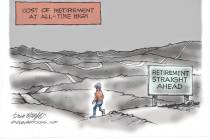EDITORIAL: Secret subpoena effort stifled
If the viability of your argument depends on having no one hear it, you don’t have much of an argument in the first place.
A federal judge saw through the cynicism in the latest attempt to keep the massive homeowners association fraud case cloaked in secrecy, slapping down a defense request to drag the Review-Journal into court under seal. If attorney Daniel Albregts really wants to subpoena this newspaper — and not just run up our legal bills in a campaign to discourage coverage of the case — he’ll have to do it in open court. And he’ll have to present a compelling reason why he’s doing it.
Mr. Albregts represents Leon Benzer, a former construction company boss accused of compromising at least 10 HOA boards by packing them with members who would pursue construction defect claims, then hire his companies and those run by conspirators to do the lucrative legal and repair work. But the public knows precious little about the case because authorities are squeezing defendants into plea agreements.
However, for two days in September, critical documents in the case were posted on the digital federal court docket, making them available for public inspection. The Review-Journal lawfully accessed the records — which included Benzer’s admission of involvement, in FBI and Las Vegas police reports — and published a story based on reporting from the documents. Benzer’s legal team responded by filing motions to block the publication of the story, move the trial and ask whether the Review-Journal did, in fact, obtain the documents during the two-day window they were public.
As reported by the Review-Journal’s Jeff German, the FBI and Las Vegas police reports were made public because of filing errors by attorneys for Keith Gregory, one of Benzer’s co-defendants. And no one disputes that the documents briefly were made public before being locked away with the rest of the case files. But Mr. Albregts wanted the Review-Journal to feel his wrath, so he asked for authority to subpoena the newspaper — under seal, of course — to examine our access to the digital docket.
Last week, U.S. Magistrate Judge George Foley Jr. denied Mr. Albregts’ request. “Defendant may file a motion for issuance of the subject subpoena with notice and a copy of said motion being served on the government” and the newspaper, Judge Foley wrote.
Mr. Albregts will have to exact his revenge in the sunlight, where all can see it. But it’s funny how a little public scrutiny changes the calculus of those accustomed to the closed doors of federal court.























